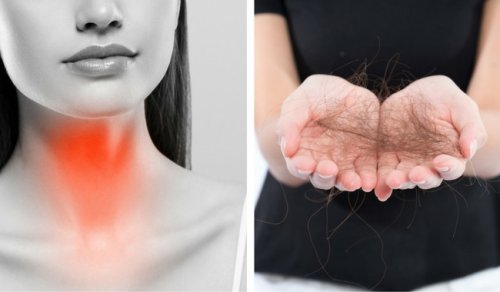8 Things to Fight Thyroid-Related Hair Loss


Reviewed and approved by the doctor Karla Henríquez
Would you like to combat hair loss but don’t know how to do it? Don’t worry! Below we’ll tell you eight things you can do to achieve this and other interesting data.
Problems related to the thyroid gland can cause changes in all of your bodily systems, and in the case of your hair it can alter the cycles of your capillaries and cause alarming hair loss.
The thyroid is a gland that performs various functions. It regulates metabolism, body temperature, assimilation of nutrients, and other aspects of your health. Therefore, if you’re suffering from an imbalance, you might notice various signs and symptoms.
Since it’s responsible for the regulation of various substances and processes, it’s not surprising that it also influences hair health.
Patients with thyroid problems are often concerned about hair loss. At this point, it’s important to mention that by following your doctor’s recommendations and maintaining a healthy lifestyle, it’s always possible to improve and maintain hair health and reduce hair loss.
Below, we’ll share some recommendations that may be useful if you want to maintain healthy hair, even when you’re being treated for a thyroid problem.
1. Take your medications
If your doctor has prescribed some type of medication or supplement to treat your thyroid problem, it’s important that you follow their instructions. This includes making sure to take the prescribed dose every day, while also keeping to the schedule.
To combat hair loss, you may also consider taking some dietary supplements (if authorized by your doctor) of zinc or collagen.

2. Improve your diet
Maintaining a balanced diet appropriate to the needs of your body is crucial to be healthy and feel good. Thyroid patients should try to follow the recommendations of their treating physician regarding the foods they should start consuming more frequently and avoid ones that aren’t recommended.
Because uncontrolled hormones can limit your body’s ability to absorb high-quality nutrients, it’s a good idea to follow a balanced and complete diet, focused on improving the hormonal situation and the thyroid gland.
Recommended foods
- Iodine: Low intake of sources of iodine is one of the main causes of thyroid hormone deficiency, a condition known as hypothyroidism.
- Fatty acids: Fatty acids are necessary for your body’s metabolism and a great complement to improve thyroid function.
- Magnesium: The correct absorption of magnesium helps maintain good metabolic and hormonal health, as it’s necessary to absorb iodine.
- Selenium: This mineral is an antioxidant that benefits your thyroid health. For example, selenium deficiency can impair the hormonal activity of your thyroid.
- Zinc: Zinc is also a party fo the delicate homeostasis of thyroid hormones.
- Iron: In addition to helping improve our resistance to diseases, iron can also help with the transporting of oxygen and carbon dioxide in the blood, the synthesis of DNA, and in the formation of collagen. An iron deficiency can also alter your thyroid’s hormones.
- Vitamins A, B, and D: All of them have important functions for your body and can alter the thyroid gland if you are deficient in these vitamins.
3. Eat more fresh food
To combat hair loss, you should prioritize consuming fresh food, always within the framework of a balanced diet.

- Fruits, vegetables, and legumes rich in lycopene to promote collagen production. For example, apples, strawberries, or beets.
- Fruits rich in vitamin C since this vitamin is necessary to change essential amino acids, such as proline into hydroxyproline, which is a form of collagen.
- Celery, cucumbers, garlic, onions, and other foods with sulfur since this mineral is vital in the production of collagen.
- Soy milk and cheese because they contain genistein, which supports collagen production.
See more: Nutritious, gluten free, lactose free oat muffins
4. Drink more water
Drinking water not only benefits the healthy function of your body’s most important systems, but it’s also essential to maintaining healthy hair.
By drinking enough water daily, depending on your thirst, you’ll be able to help avoid excessive hair loss and other problems, such as dryness and dandruff.
5. Avoid using gadgets
Heated appliances such as curling irons, hair dryers, and straighteners, among others, are the number one enemies of healthy hair, especially if it’s already weakened by your thyroid.
These appliances can affect the structure of the hair strands themselves, reducing their strength, and eventually cause it to break and fall.
6. Add gelatin to your shampoo

The amino acids contained in unflavored gelatin are very beneficial for caring for and strengthening your hair. However, some people consider applying it to roots, weekly or periodically, as a part of their hair treatment, which also could work.
Additionally, some people believe that applying this substance to the scalp can help prevent further hair loss.
To use, just add half of a packet of gelatin powder to each eight ounce bottle of natural shampoo.
7. Use hair treatments
While it’s true that you need to maintain a good diet to make sure you give your body what it needs to function properly, you should also make sure to take care of yourself on “the outside.”
As a result, you should consider switching your hair care products and evaluating how they make your hair feel. In some cases, a change of shampoo and the weekly application of masks or cream baths can all contribute positively to your hair’s health.
8. Avoid chronic stress

Chronic stress can worsen thyroid-related hair loss. Therefore, to combat hair loss, it’s best to seek the necessary tools to learn to manage stress and emotional tension in the best way possible, day by day.
Some people prefer to meditate or practice techniques such as mindfulness, while other people prefer drawing, dance, or other activities. In fact, some people prefer just to go for a walk in the fresh air. Any option is valid, as long as it brings you benefits.
However, if you feel like you need professional help, don’t hesitate to seek it out. Going to a psychologist can also contribute to your well-being and in regard to your health, such as preventing hair loss.
Discover: How to Manage Stress Properly
Ready to combat thyroid-related hair loss?
Remember that, if you have a thyroid problem, it’s essential that you follow professional medical recommendations and maintain good lifestyle habits. This will not only help your general well-being but also can give you other benefits, such as healthy, beautiful hair.
The tips we mentioned here can be put into practice immediately as a supplement for the care of your hair, but keep in mind that they should never be your only option. To take full care of yourself, you need to use several consistent strategies at the same time.
All cited sources were thoroughly reviewed by our team to ensure their quality, reliability, currency, and validity. The bibliography of this article was considered reliable and of academic or scientific accuracy.
- Jackson, AJ, y Price, VH (2013, enero). Cómo diagnosticar la pérdida del cabello. Clínicas dermatológicas. https://doi.org/10.1016/j.det.2012.08.007
- Momčilović, B., Prejac, J., Višnjević, V., Skalnaya, M., Mimica, N., Drmić, S., y Skalny, AV (2014). Yodo capilar para la evaluación del estado del yodo humano. Tiroides, 24(6), 1018-1026. https://doi.org/10.1089/thy.2012.0499
- Tanimura, S., Tadokoro, Y., Inomata, K., Binh, NT, Nishie, W., Yamazaki, S.,… Nishimura, EK (2011). Las células madre del folículo piloso proporcionan un nicho funcional para las células madre de melanocitos. Cell Stem Cell, 8(2), 177–187. https://doi.org/10.1016/j.stem.2010.11.029
This text is provided for informational purposes only and does not replace consultation with a professional. If in doubt, consult your specialist.








